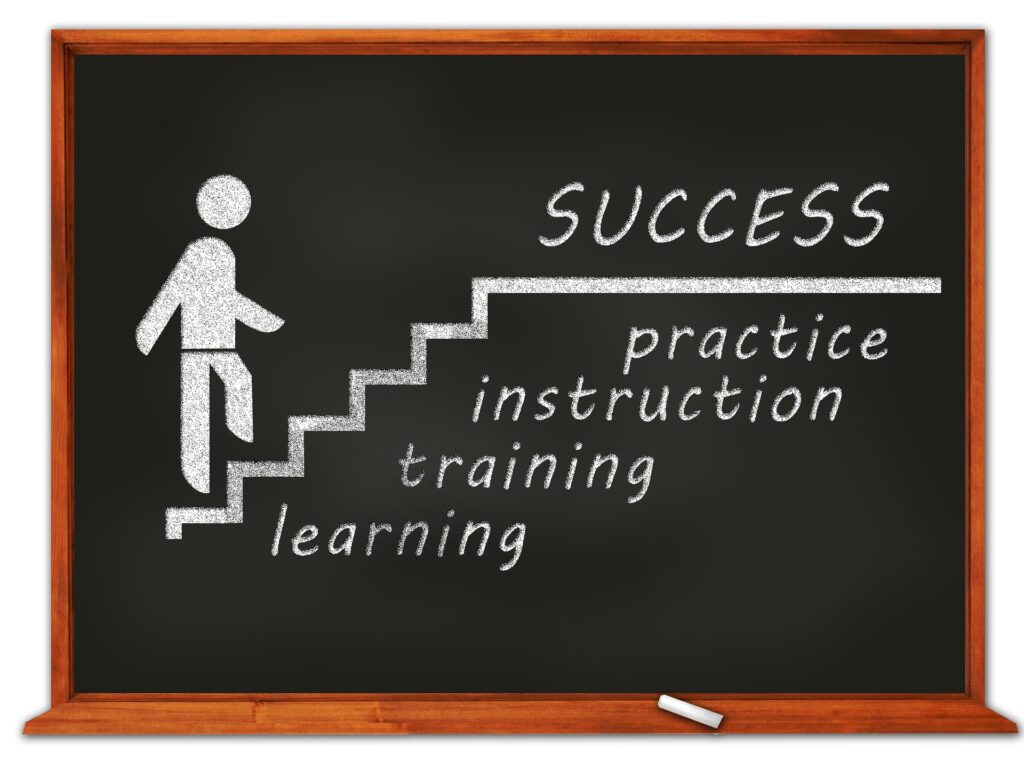With the ever-changing world, disciplines, professions, and technologies are changing at breakneck speed in our modern-day information society.
So, whether you want to change jobs, prepare for the next-level role, or maybe even start a business, you need to keep upskilling to stay competitive or even have a chance of entering the door.
To put it precisely, if you snooze, you lose!
However, with that being said, acquiring and mastering a new skill -although a rewarding journey- is often a long and complex process that is very challenging.
And with bosses giving us tasks that are due in two days to school projects that are due in only a week, the learning time continues to be shortened.
Trying to keep up with learning new skills that will improve your efficiency in the shortest time possible might leave you feeling overwhelmed.
And when you fail to learn a skill quickly, you might begin to construct self-limiting beliefs like; am probably not good at this, or maybe I’m just a slow learner.
Well, you’re not alone in this type of thinking.
In this blog, I will discuss the Dreyfus model which explains the different levels of skill acquisition.
Understanding this model will help you appreciate what it takes to become really good at anything, so you can stop beating yourself up about why you’re a slow learner.
I will also discuss how you can use this model to acquire and master new skills.

But, before we dive in, it’s worth taking a moment to define exactly what a skill is.
A skill is an ability to perform a specific task or activity to a high level of proficiency.
Now, let’s begin by talking about the researchers behind this model and what it is.
The Dreyfus model of skill acquisition
This model was developed by brothers Stuart and Hubert Dreyfus in 1980 based on research that was carried out at the University of California in Berkeley.
The model focuses on four mental functions: recollection, recognition, decision, and awareness, and how they vary at each level of expertise.
Each time any of these mental functions matures, your level of expertise rises.
This model explains the five levels of skill acquisition that you go through before you fully master any skill.
Let’s get into them.
1. Novice
This is the amateur stage where you’re just learning about the basic rules of the skill that you are trying to learn.
Say for example you want to master the skill of copywriting.
At this stage, you’ll learn all the rules about copywriting without an understanding of where to apply them, or even what the point is of learning them.
Ensure you learn all the rules of the skill but don’t stress yourself out a lot.
After learning them, try to create maxims that you can follow regardless of the context.
2. Advanced learner
At this stage, nothing is integrated yet, and you really don’t know anything about what you’re doing.
You’re just following the rules you learned as a novice.
So, as you begin to apply the rules to new situations, allow yourself to have fun while trying out different contexts to gauge where the rules apply and where they don’t.
When you’re at this stage, it will feel as if you’re faking it -but don’t worry because, through faking, you’ll gain some experience that you’ll need to get to the next level.
And the progression from abstract to more concrete experiences will start to happen.

3. Competent
This is perhaps the most interesting stage because this is where you begin to make some mistakes and the integration begins to happen.
At this stage, you’re no longer blindly following rules, but you are getting a better grip on when and where to apply the copywriting rules you’ve learned.
You’ll even encounter situations where the rules don’t apply, or where it’s unclear which rules to follow and you’ll start to experience friction.
The wonderful thing about this stage is that as you begin to make lots of mistakes, you’ll also gradually learn from them -which will make you better.
And as you encounter different contexts, you’ll become more familiar with them and even comfortable and that’s when you’ll start to gain experience.
However, even if you’re starting to get the hang of things, at this stage you haven’t yet developed much of an intuition; you’ll still approach the task in a very intentional and methodical way.
4. Proficient
At this stage, you know what to do in a given situation when it comes to copywriting.
You still have to consciously choose among the several ways of doing it, but there’s little ambiguity about the right course of action.
5. Expert
Now here’s where you act according to intuition.
You have been practicing the skill of copywriting for so long that you can recognize patterns and make decisions quickly using intuition.
At this stage, your performance looks effortless and even magical to an outside observer.
To the untrained eye, a proficient and expert person can look similar because the difference is subtle; but the subtlety is the difference.
It’s important to note, however, that even experts are still very methodical about their approach, so intuition is not the hallmark of being an expert at any given skill or subject.
Now that you know the different levels you have to go through before you become an expert at any skill, is it still wise to beat yourself up about how slow you’re learning?
Probably not.
So, let’s now discuss how you can use this model to drive the way you learn any skill.

1. Recognize where you are on the model.
When you’re trying to acquire any skill, the first thing you should do is discover where you fall on the model.
Are you a novice? An advanced beginner? Or are you on the cusp of becoming competent or an expert? A modicum of self-insight can help enormously.
After discovering where you fall, ask yourself: what qualities, talents, and character traits do I possess that will help me master this skill?
Asking yourself these questions generates the insight required to learn. So, take the information you get and use it to drive your learning.
For example, when you discover that you’re a novice, here’s what you need to do:
- Understand the history of the skill. Learn as much as you can about its origins, uses, and benefits. Collecting this information will help you align the skill with your broader goals.
- Immerse yourself in learning all the rules and guidelines of the skill. This will provide you with the foundation that you require to grow.
- Set clear milestones. These clear expectations will help you to accurately self-assess where you stand at any point in time along the learning journey.
2. Practically try out the skill.
The first time you learn the rules of the skill, you’ll have an abstract and theoretical understanding of how to apply it.
To cultivate the skill, you’ll have to try it out in different contexts because acquiring and mastering new skills ultimately involves putting theory into practice.
You’ll struggle at first, but that is okay. It’s part of the process. Accept it, embrace it, and move on.
For example, since we are using copywriting as our example, the first 50 articles you’ll write will be terrible.
But keep practicing because learning by doing is vital to mastering or honing your skills.
3. Be consistent in your practice.
The Dreyfus model assumes that the longer you practice the more competent you become at any skill.
It’s important to keep in mind that for the first couple of days of practicing the skill, you’ll ride the wave of motivation.
However, as the novelty wears off, you might start skipping practice.
You’ll stop being consistent, which is very detrimental to your efforts to hone the skill.
Remember that each stage requires time and practice.
Here’s what you need to do to be consistent with honing your skill.
- Make time to learn. Set aside time every day to learn and practice the new skill you’re trying to acquire. It’s important to arrange this time so that you don’t lose focus on what you are trying to achieve.
- Split your learning sessions into a series of smaller steps. This will make learning easier and more enjoyable which will help you stay consistent in practicing your new skill.
- Don’t break the chain. In learning any new skill, this should be your only job. Whether the result is good or bad, show up every day and practice. No excuses!
Here’s a statement I came across that gave me some much-needed perspective on consistency: One day is a lapse. Two days is the beginning of a new habit — the habit of not being consistent.
4. Get feedback.
To put new skills into practice as effectively as possible, it’s essential to get regular feedback.
Good feedback allows you to reflect more deeply, which is vital to the learning process.
While there are no rules as to when you should ask for feedback as you learn the new skill, it may be most effective to do so any time you make progress during your journey.
Asking for feedback during this time may help you notice areas that need additional attention so you can adjust immediately.
You can also self-assess and see the areas that you need to improve. You can do this by taking out time every day to reflect on the progress you’re making.
Ask yourself these questions: what went well? What should I improve on next time?
Self-reflection strengthens your personal growth and allows you to monitor your progress.
With all this being said, you might be wondering where to get information on the skill you would like to acquire.
Well, here are a few avenues you can consider exploring.
- Books: Books have traditionally been one of the most popular and reliable resources for learning, and they continue to be an important source of knowledge and information today.
They have some unique advantages, such as being able to provide in-depth and detailed information on a specific topic.
- YouTube tutorials: YouTube has made learning different skills easy. Even topics with hard concepts and complex theories become fun with audio/ visual content. Most educators from across the world are continuously uploading content on YouTube for free. So why not use this great opportunity to learn a new skill?
- Mentors: Do you know someone with relevant experience in the skill you’re looking to acquire? If so, why not consider asking them to mentor you on your journey to acquiring the skill? Not to mention that their feedback on your progress will be very helpful.
Conclusion
It’s no doubt that one of the things we need to do continuously in life is to acquire skills that will keep us aligned with the ever-changing needs of the developing world.
And since you now understand that it takes quite some time to get good at anything, if you have a skill in mind that you know will improve your efficiency at your job or your business, why not start now to hone it?
I would love to know your thoughts on this article. Please leave a comment below.

- Hey there! Welcome to thehealseekers, a space dedicated to helping women explore metaphysics, psychology, and self-development as tools for clarity, purpose, and goal achievement. I hope you find inspiration here.
Latest Post
 Self-developmentMarch 2, 2026Sustainable Success Requires Alignment: Why Effort Alone Is Not Enough
Self-developmentMarch 2, 2026Sustainable Success Requires Alignment: Why Effort Alone Is Not Enough Self-developmentJanuary 30, 2026What to Do When Your Career Looks Right on Paper But Feels Wrong Inside
Self-developmentJanuary 30, 2026What to Do When Your Career Looks Right on Paper But Feels Wrong Inside Self-developmentJanuary 30, 2026You Have an Attention Problem, and It’s Costing You Your Goals
Self-developmentJanuary 30, 2026You Have an Attention Problem, and It’s Costing You Your Goals Self-developmentJanuary 24, 2026How to Turn Your ‘Impossible’ Desires Into Reality
Self-developmentJanuary 24, 2026How to Turn Your ‘Impossible’ Desires Into Reality
